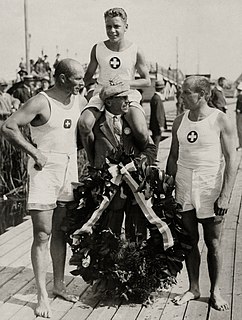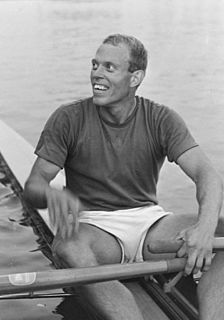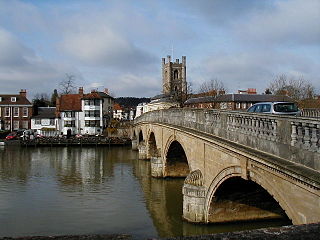
The men's single sculls competition at the 2004 Summer Olympics took place at Schinias Olympic Rowing and Canoeing Centre, Greece. The event was held from August 14 until August 19 and was one of six events for male competitors in Rowing at the 2004 Summer Olympics in Athens. There were 29 competitors from 29 nations, with each nation limited to a single boat in the event. The event was won by Olaf Tufte of Norway. Silver went to Jüri Jaanson of Estonia, with bronze to Ivo Yanakiev of Bulgaria. It was the first medal in the men's single sculls for all three nations. Marcel Hacker's failure to make the final made this the first men's single sculls race since 1956 without a German rower on the podium; between the United Team of Germany, East Germany, West Germany, and Germany, the German medal streak in the event had been 11 Games long.

The men's single sculls event was a rowing event conducted as part of the Rowing at the 1964 Summer Olympics programme. It was held from 11 to 15 October at the Toda Rowing Course. There were 13 competitors from 13 nations, with each nation limited to a single boat in the event. The event was won by Vyacheslav Ivanov of the Soviet Union, his third consecutive victory in the event. Ivanov's three gold medals in the event remains tied for the best results for any individual single sculler ; only Ekaterina Karsten has more medals in (women's) single sculls, though she took only two golds along with a silver and a bronze. The second spot on the podium was also a repeat of 1960; Achim Hill of the United Team of Germany became the sixth man to win multiple single sculls medals by repeating as silver medalist. Bronze this time went to Gottfried Kottmann of Switzerland, that nation's first medal in the event since 1924.

The men's single sculls competition at the 1992 Summer Olympics in Barcelona was held from 27 July to 1 August at Lake of Banyoles. The event was an open-style, individual rowing event conducted as part of the Rowing at the 1992 Summer Olympics program. There were 22 competitors from 22 nations, with each nation limited to a single boat in the event. The event was won by Thomas Lange of Germany, the fourth man to successfully repeat as Olympic champion. It was the first appearance of "Germany" since 1936, though German rowers representing the United Team of Germany, West Germany, and East Germany had won 10 medals in 8 Games from 1960 to 1988. Václav Chalupa of Czechoslovakia took silver, that nation's first medal in the men's single sculls. Poland's Kajetan Broniewski earned that nation's first medal in the event since 1960 with his bronze.

The men's single sculls competition at the 2012 Summer Olympics in London took place at Dorney Lake which, for the purposes of the Games venue, was officially termed Eton Dorney. It was held from 28 July to 3 August. There were 33 competitors from 33 nations. The event was won by Mahé Drysdale of New Zealand, the nation's first victory in the event since 2000. Ondřej Synek of the Czech Republic earned his second consecutive silver in the event; Drysdale and Synek were the 13th and 14th men to win multiple medals in the single sculls; they would go on to be the 5th and 6th to earn three in the event in 2016 when Drysdale repeated as champion and Synek added a bronze. The 2012 bronze went to Alan Campbell, Great Britain's first medal in the event since 1928.

The men's single sculls event was part of the rowing programme at the 1928 Summer Olympics. It was one of seven rowing events for men and was the seventh appearance of the event, which had been on the programme for every Games since rowing was added in 1900. There were 15 competitors, each from a different nation. The event was won by Bobby Pearce of Australia, the nation's first medal in the event. Silver went to Ken Myers of the United States, extending that nation's podium streak to three Games. David Collet of Great Britain took bronze; that nation had also earned a medal each time it appeared and had a five-Games podium streak.

The men's coxed pair event was part of the rowing programme at the 1928 Summer Olympics. It was one of seven rowing events for men and was the fourth appearance of the event. It was held from 3 to 10 August near Sloten, Amsterdam. There were 6 boats from 6 nations, with each nation limited to one boat in the event. The event was won by the Swiss team, the nation's second consecutive victory in the event. Brothers Hans Schöchlin and Karl Schöchlin rowed, with Hans Bourquin the coxswain. Another pair of brothers took silver: France's Armand Marcelle and Édouard Marcelle. The Belgian bronze medal team consisted of Léon Flament, François de Coninck, and Georges Anthony; it was the nation's first medal in the event.

The men's single sculls competition at the 1972 Summer Olympics in Munich took place from 27 August to 2 September at the Olympic Reggatta Course in Oberschleißheim. There were 18 competitors from 18 nations, with each nation limited to a single boat in the event. The event was won by Yury Malyshev of the Soviet Union, the nation's fifth victory in the event; the Soviets returned to the top of the podium after having their four-Games (1952–1964) winning streak broken in 1968. Alberto Demiddi of Argentina took silver, the seventh man to win multiple medals in the single sculls. Wolfgang Güldenpfennig earned bronze, the first medal for East Germany as a separate team.

The men's single sculls competition at the 2000 Summer Olympics in Sydney, Australia took place at the Sydney International Regatta Centre. It was held from 17 to 23 September. There were 24 competitors from 24 nations, with each nation limited to a single boat in the event. The event was won by Rob Waddell of New Zealand, the nation's first victory in the event after bronze medals in 1920 and 1988. Defending champion Xeno Müller of Switzerland placed second, becoming the 11th man to win multiple medals in the event. Marcel Hacker of Germany took bronze; it was the 11th consecutive Games with a German rower on the podium in the event.

The men's single sculls competition at the 1956 Summer Olympics took place at Lake Wendouree, Ballarat, Australia. The event was held from 23 to 27 November. There were 12 competitors from 12 nations, with each nation limited to a single boat in the event. The event was won by Vyacheslav Ivanov of the Soviet Union, the nation's second consecutive victory in the men's single sculls. Ivanov was so thrilled when he was presented with his gold medal that he jumped up and down with joy-and dropped the medal into Lake Wendouree. He immediately dived into the lake to retrieve it, but couldn't find it. After the games were over he was given a replacement medal. Stuart Mackenzie took silver, making it the second consecutive Games with an Australian runner-up. American John B. Kelly Jr., after missing the finals in 1948 and 1952 by 0.4 seconds and 0.2 seconds respectively, reached the final and took the bronze medal this time.

The men's single sculls competition at the 1960 Summer Olympics took place at Lake Albano, Italy. The event was held from 30 August until 3 September. There were 13 competitors from 13 nations, with each nation limited to one boat in the event. The event was won by Vyacheslav Ivanov of the Soviet Union, the second man to successfully repeat as Olympic champion. It was the third consecutive Soviet victory in the event, with Yuriy Tyukalov winning in 1952 before Ivanov's victories in 1956 and 1960. Ivanov would go on to win again in 1964, becoming the first man to win 3 gold medals in the event. The silver medal went to Achim Hill of the United Team of Germany, the first medal in the men's single sculls for the combined team and the first single sculls medal for any German rower since 1936. Teodor Kocerka of Poland took bronze. Ivanov and Kocerka were the fourth and fifth men to win multiple medals of any colour in the event, with Kocerka previously taking bronze in 1952. It was Kocerka's third straight final in the event, placing fourth between his two bronzes. Australia's three-Games podium streak ended when Stuart Mackenzie fell ill and could not compete.

The men's single sculls competition at the 1968 Summer Olympics took place at Virgilio Uribe Rowing and Canoeing Course, Mexico. The event was held 15–19 October. There were 17 competitors from 17 nations, with each nation limited to a single boat in the event. The event was won by Jan Wienese of the Netherlands, with Jochen Meißner of West Germany taking silver and Alberto Demiddi of Argentina earning bronze. It was the first medal in men's single sculls for each of the three nations. The Soviet Union's four-Games winning streak in the event ended; three-time champion Vyacheslav Ivanov was left off the team in favor of Viktor Melnikov; Melnikov finished fourth in his semifinal and did not reach the main final.

The men's single sculls competition at the 1976 Summer Olympics took place at Notre Dame Island Olympic Basin, Canada. The event was held from 18–25 July. There were 15 competitors from 15 nations, with each nation limited to a single boat in the event. The event was won by Pertti Karppinen of Finland, the nation's first medal in the men's single sculls. Karppinen would go on to win three consecutive golds in the event, matching the Soviet Union's Vyacheslav Ivanov who did the same from 1956 to 1964. Silver went to Peter-Michael Kolbe of West Germany; East Germany took its second consecutive bronze medal in the event, this time with Joachim Dreifke as the rower.

The men's single sculls competition at the 1984 Summer Olympics took place at Lake Casitas, California, United States of America. The event was held from 31 July to 5 August. There were 16 competitors from 16 nations, with each nation limited to a single boat in the event. The event was won by Pertti Karppinen of Finland, his third consecutive victory. Silver went to Peter-Michael Kolbe of West Germany; Kolbe, who had also taken silver in 1976, was the ninth man to earn multiple medals in the single sculls and the first to do so in non-consecutive Games. Canada earned its first medal in the event since 1912 with Robert Mills's bronze. East Germany's three-Games podium streak ended with no rowers from that nation present due to the Soviet-led boycott.

The men's single sculls competition at the 1988 Summer Olympics took place at Misari Regatta, South Korea. The event was held from 19 to 24 September. It was the 20th appearance of the event, which had been held at every Olympic Games since the introduction of rowing in 1900. NOCs were limited to one boat apiece; 22 sent a competitor in the men's single sculls. Thomas Lange of East Germany won the event, denying Pertti Karppinen a record fourth-straight win and starting a two-Games winning streak of his own. Peter-Michael Kolbe of West Germany took his third silver, joining Karppinen and Vyacheslav Ivanov as three-time medalists in the event. New Zealand earned its first medal in the event since 1920, with Eric Verdonk taking bronze.

The men's single sculls competition at the 1936 Summer Olympics took place at Grünau Regatta Course, near Berlin, Germany. The event was held from 11 to 14 August. There were 20 competitors from 20 nations, with each nation limited to a single boat in the event. The event was won by Gustav Schäfer of Germany, the nation's first victory in the event and first medal of any colour in the men's single sculls since 1908. Josef Hasenöhrl took silver, Austria's first medal in the event. Dan Barrow earned bronze, extending the United States' podium streak in the event to five Games; the Americans had taken a medal in each of the six times they competed in the event.

The men's single sculls competition at the 1996 Summer Olympics took place at Lake Lanier, Atlanta, United States of America. The event was held from 21 to 27 July 1996. There were 21 competitors from 21 nations, with each nation limited to a single boat in the event. The event was won by Xeno Müller of Switzerland, the nation's first victory in the event and first medal of any color since 1960. Derek Porter's silver was Canada's best-ever result in the event, over bronze medals in 1912 and 1984. Two-time defending champion Thomas Lange of Germany finished with a bronze medal this time, becoming the fourth man to win three medals in the event.

The men's coxed pair rowing competition at the 1980 Summer Olympics took place at Krylatskoye Sports Complex Canoeing and Rowing Basin, Moscow, Soviet Union. The event was held from 20 to 27 July. There were 11 boats from 11 nations, with each nation limited to a single boat in the event. The event was won by Harald Jährling, Friedrich-Wilhelm Ulrich, and coxswain Georg Spohr of East Germany, the first men to successfully repeat as Olympic champions in the event. It was also the first time that a crew of the same three men earned multiple medals of any colour. East Germany's three straight medals matched the United States for most among nations to that point. Silver went to the Soviet Union again, though with an entirely different team from its 1976 runner-up crew; the silver medalists this time were Viktor Pereverzev, Gennadi Kryuçkin, and cox Aleksandr Lukyanov. Duško Mrduljaš, Zlatko Celent, and cox Josip Reić earned Yugoslavia's first medal in the event with their bronze.

The men's coxed pair competition at the 1948 Summer Olympics in London took place at Henley-on-Thames, London. It was held from 5 to 9 August. There were 9 boats from 9 nations, with each nation limited to a single boat in the event. The event was won by the Danish team, rowers Finn Pedersen and Tage Henriksen and coxswain Carl-Ebbe Andersen; it was the first medal in the men's coxed pair for Denmark. Italy won its second consecutive silver medal, with Giovanni Steffè, Aldo Tarlao, and cox Alberto Radi. Hungary also earned its first medal in the event, a bronze for Antal Szendey, Béla Zsitnik, and cox Róbert Zimonyi. The French three-Games pre-war podium streak ended.

The men's coxed pair competition at the 1952 Summer Olympics took place at Meilahti, Finland. It was held from 20 to 23 July. There were 15 boats from 15 nations, with each nation limited to a single boat in the event. The event was won by French team Raymond Salles, Gaston Mercier, and coxswain Bernard Malivoire; it was the nation's first victory in the event. Germany, which had won the event in 1936 but had been excluded from the 1948 Games after World War II, took silver. Sweden, the defending champions, had an all-new crew of Svend Ove Pedersen, Poul Svendsen, and cox Jørgen Frantzen; they took bronze.

The men's coxed pair competition at the 1992 Summer Olympics took place at Lake of Banyoles, Spain. It was held from 28 July to 2 August. There were 16 boats from 16 nations, with each nation limited to one boat in the event. The event was won by brothers Greg and Jonny Searle and coxswain Garry Herbert of Great Britain, the nation's first victory in the event. It was the third consecutive Games with brothers winning as the rowers; Italy's Carmine Abbagnale and Giuseppe Abbagnale had won in 1984 and 1988. They, along with longtime cox Giuseppe Di Capua, took silver this year, becoming the only crew to win three medals together in the event. Bronze went to Romanians Dimitrie Popescu, Nicolae Țaga, and cox Dumitru Răducanu. Popescu and Răducanu had been on the 1984 silver medal team, making them the 16th and 17th—and final—men to earn multiple medals in the event.


















